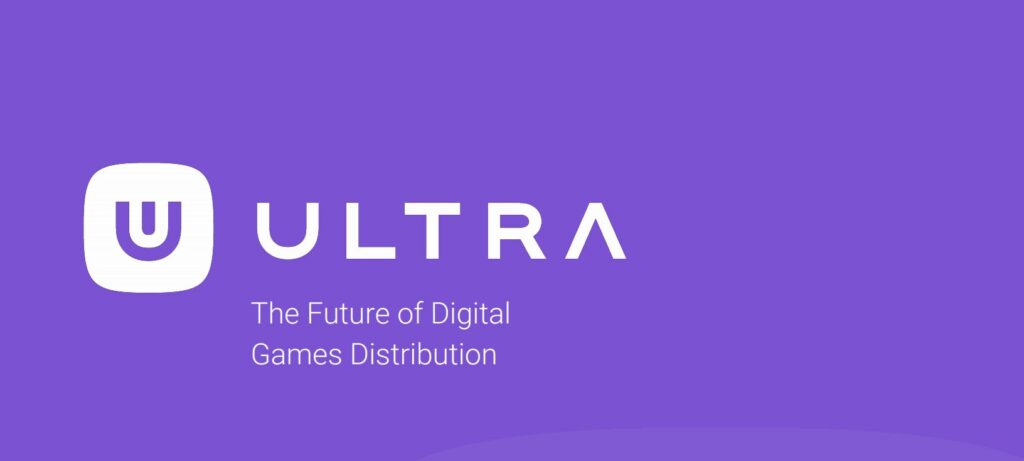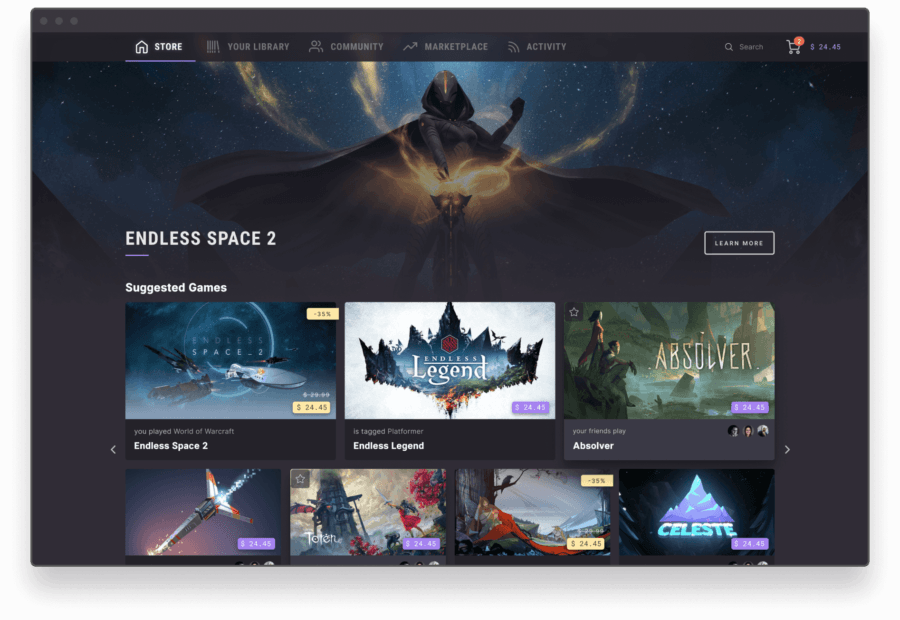
It’s a heady, contentious battlefield of storefronts and game distribution platforms out there at the moment, with Steam’s seemingly monolithic strategy continuing to be prodded at by the Epic Games Store, Discord, Robot Cache, GOG, and Kongregate, with additional publisher distribution from EA, Ubisoft, Bethesda, and Activision Blizzard. With all the choices, it sometimes can feel like the digital version of choosing a jar of jam at the supermarket, for consumers and developers alike.
Ultra is the newest contender to the distribution arena and its led by a formidable platoon of industry veterans. Their aim is to drastically improve the ecosystem in and around the online distribution of PC games. Ultra is underscoring their challenge at GDC by announcing an invitation to developers to sign up for a closed beta exploration of the innovative Ultra distribution platform.
Although Ultra has been largely acting in stealth mode, developers have already shown very keen interest in the team launching a credible alternative to the platforms that have had the game distribution space to themselves for a decade.
Over 100 developers and publishers have quietly signed up to launch their games on Ultra. As GDC is the largest developer gathering of the year in North America, the conference offers the opportunity to all of this worldwide contingent to sign up for the developer closed beta and find out for themselves how Ultra compares to the incumbent platforms.
The company is confident of Ultra’s many advantages for both developers and players, which will be evident in the beta. Ultra enumerates the topline: A back-end that is fully intuitive. Ease of use and quick to set up. Simple to maintain for games of any size.
Something that is of critical importance to the developers’ businesses, Ultra takes a dramatically smaller commission on the retail price than has been imposed for a decade by other distribution platforms. The startup is urging developers to visit their website for a comprehensive overview. This will be followed over the next few weeks with information on how to register both personal and company usernames, generate referral codes, and access the SDK. Ultra is also offering its invitation to a private demo of the platform during GDC by contacting Senior Director of Developer Relations, Melissa Brown directly.
Ultra is led by a team of game industry heavyweights, including veteran alumni from Steam, Google, and Apple that bring collective experience spanning over fifteen years in the industry. Leadership, drawing on significant industry experience, is looking to overhaul what game distribution looks and feels like for developers and gamers alike.
Where consumers are concerned, Ultra is conceived as an advanced, sophisticated, feature-heavy gameplay environment. Ultra is also building upon its deep industry relationships to secure impressive partnerships and compelling games, some of which may be available exclusively on Ultra for extended periods of time.
Ultra utilizes a modified version of Nextgen blockchain (called EOS), which provides better security and allows an initial capacity of over 13,000 transactions per second without the need for transaction fees.
When Steam first launched in 2002, it was a welcome alternative to old school distribution methods. Steam attracted its initial user-base (and has since grown to 90 million monthly active users) by offering a wide range of games from a number of different creators in one place. But, over the years, developer enthusiasm has soured for several reasons, not the least of which is the trouble with discoverability; twenty to thirty new games are launched on Steam daily.
This is further aggravated by the fact that online distribution platforms as a whole provide neither the means nor opportunity to market, promote, or differentiate their games from competing titles. To see success, developers are required to invest elsewhere to advertise and promote, which is a considerable expenditure for those who can afford it, and a non-starter for those who can’t.
As one developer, who prefers to remain anonymous stated, “[The distribution platform] is not earning [its] 30%. You get almost nothing now from being on Steam other than the fact their near-monopoly has limited your options. Steam does not drive users to you at all.”
Ultra emerged two years ago when game tech execs, out of several major gaming companies or technology vendors, noted the gathering discontent with the overwhelming clout of a single platform.
These are leaders who succeeded at companies such as Apple, Google, AMD, Xiaobawang, Ubisoft, Dell, and Time Warner. They saw an opportunity to create a distribution platform that could be technologically superior while still treating people equitably. Their goal is to create an ecosystem where the experience is positive for everyone, including players.

Steam’s revenue share model has somewhat changed over the last six months, but it isn’t to the benefit of smaller developers. Ultra is committed to ensuring that developers are supported, compensated quickly for sales, and hand over a smaller percentage of revenue. Ultra remits 85 percent of purchases back to developers, requiring only a 15 percent rev-share split, and payment is sent immediately, instead of being forced to wait thirty to sixty days.
Ultra provides a rich collection of in-store selling assets they call the Marketing Toolbox. The Toolbox includes a variety of marketing & promotional utilities, including an influencer program to attract gamers to their products.
User experience matters, especially in storefronts. Where there’s clutter, there’s confusion, and where there’s confusion, there’s a lost sale for developers (and potentially a customer going elsewhere for a game). Ultra is dedicated to creating a user experience that’s clean, fast, and secure.
Ultra leadership is confident in the company’s philosophy and that their credibility will get developers to migrate to a platform that better suits their needs in the long run. Shaking up the status quo can be messy, but developers and players alike deserve a platform that will grow and change with them, instead of lumbering along, unable to pivot and implement change in a timely manner.
 GameDaily.biz © 2025 | All Rights Reserved.
GameDaily.biz © 2025 | All Rights Reserved.